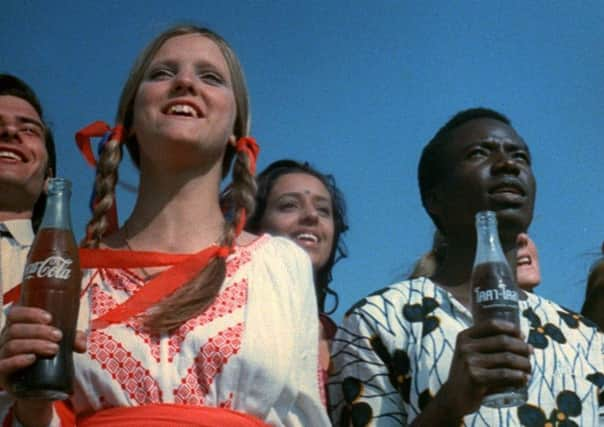Cameron Wyllie: SNP seems to think school is like a Coke advert


The SNP government has had laudable intentions regarding education, not least their oft-mentioned desire to ‘close the attainment gap’ – to tackle the issue of why it is that children from less privileged backgrounds do less well at school.
For sure, that’s a complex issue, and it’ll cost a busload of money to solve, but no one interested in Scotland’s future could disagree with the aim, and some modest advances appear already to have been made.
Advertisement
Hide AdAdvertisement
Hide AdIt is, of course, also a great soundbite and the government has proven itself very adept at marketing ideas that sound good, not least in education: indeed, it could be argued that the whole of Curriculum for Excellence is, at base, a great soundbite.
Recently, schools have again found themselves dealing with the policy of ‘inclusion’, an idea being pushed forward by the ‘Presumption of Mainstreaming’ consultation, which began in November 2017 and which is itself part of the consultation on ‘equity and excellence for all’.
It all sounds terrific. As far as is possible, children, regardless of their learning capacity or learning difficulties, will go to the same schools, in an effort to help them understand the wider world and each other and to enhance the opportunities to become the ‘responsible citizens’ of the Curriculum for Excellence.
You could quibble on two things from the start – does it make sense for nearly everyone to be ‘mainstreamed’ – don’t you have to have other streams to have a main one? Plus – and this is an argument for another day – isn’t there an
inherent contradiction in wanting everyone to be mainstreamed while at the same time continuing to praise separate Catholic education – or is that just a different main stream?
However, this move towards inclusion is fraught with difficulties in actual classrooms, where real teachers teach big classes of real children with each individual child having their own educational strengths and weaknesses.
Teachers, already struggling with everything that the government, Education Scotland and other agencies, not least the Scottish Qualifications Authority (SQA), chuck at them, are now expected to take on the responsibilities of specialist teaching of children with a whole host of learning needs, with the twin parrots of health-and-safety law and disability legislation speaking in their ears.
Really the question is this: are children who previously would have benefited from specialist education in small classes in purpose-built facilities, actually better off being supported by – at best – a bit of specialist help in a ‘mainstream’ class?
Advertisement
Hide AdAdvertisement
Hide AdOr is their ‘education’ being eroded by a grander desire for social justice and equity?
Once again, our schools – and the professionals who work in them – are being set up as laboratories in a grand social experiment.
Let’s remember that a great deal of public money has been rightly spent on the training of teachers with specialist qualifications who, previously, would have had smaller classes where they could really exercise their expertise and who now find themselves with the prospect of being farmed out to mainstream schools to spend an hour here and there trying to help a child catch up with their class.
The other problem with the whole concept of inclusion is that it has become increasingly difficult for headteachers, who, in this area, lack anything like the autonomy they had in the past, to exclude pupils from their ‘mainstream’ education, regardless of what they have done.
Scottish schools produce many, many well-motivated, hard-working and well-behaved young people, but there is a tiny minority of children, some of them with recognised and diagnosed disorders, who take up a huge amount of their teachers’ time, unsettle their peers, and who, let’s not forget, are probably not being educated very successfully themselves.
This is a problem for everybody in schools – the unstable adolescent who, bored by another attempt at National 4 French, puts off other kids and adds to the daily stress of their teachers’ lives.
Maybe if the consultation was, instead of the ‘Presumption of Mainstreaming’, retitled the ‘Presumption of Lumping Everyone Together’ it would be more realistic.
The government needs to have a real think about education and about children’s needs.
Advertisement
Hide AdAdvertisement
Hide AdIn fact, the pleasing sound of ‘inclusion’ covers the rather harder message of ‘saving money’ – actually we need a lot less ‘mainstreaming’ and a lot more variety and choice in our educational provision, particularly in the area of vocational education, though we all have to accept that that inevitably costs.
We are in danger of moving away from ‘school’ – as in learning, ethos, self-discipline, career, satisfaction, and, dare it be said, scholarship – to ‘school’ as Coca-Cola advert, with all our children, regardless of their needs, set out on a hillside while their teacher sings that great 70s anthem “I’d like to teach the world to sing in perfect harmony” and then stops, looks around and says: “Well, I’d like to, but I can’t because I’ve got to fill in all these forms, attend three meetings on pupils’ needs and go to a conference called ‘Citizenship and E-Learning’. In fact, I’d just like to teach.”
So please, Mr Swinney, find out what parents, pupils and teachers, including specialist teachers, really think about ‘inclusion’ before you press on.
Cameron Wyllie is the former principal of George Heriot’s School
